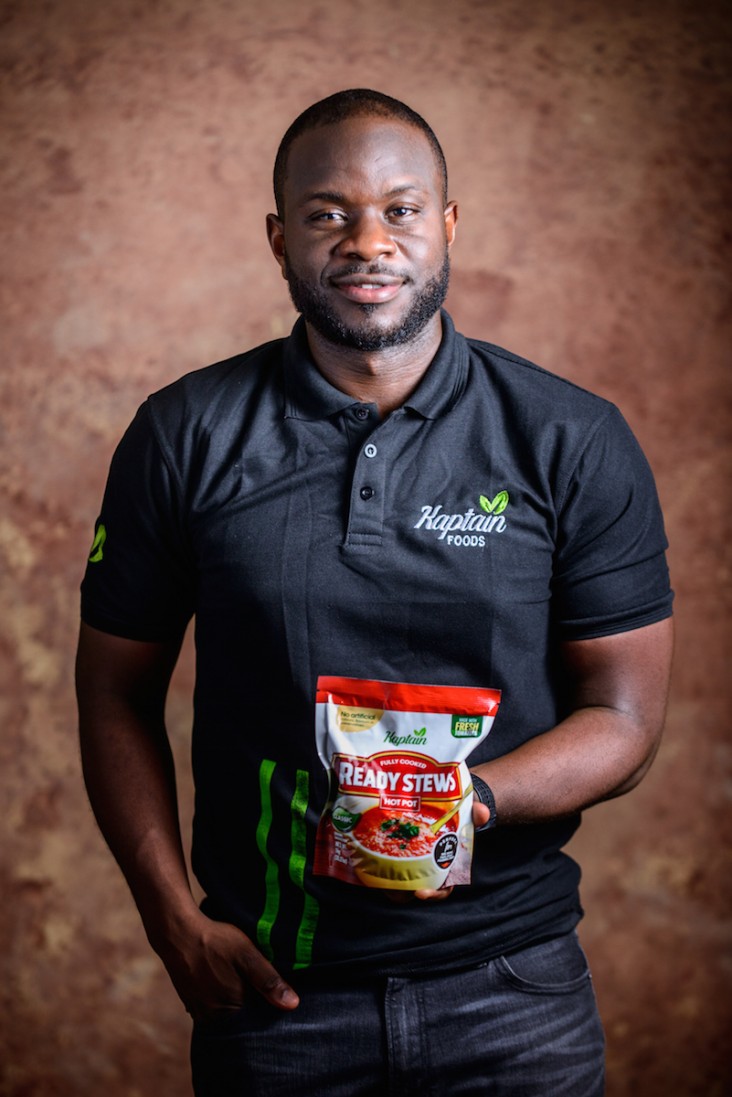Speeches Shim

November 2017—As a university student in the United States, Onyekachi Ekezie missed the homemade stews he ate growing up in Nigeria. For a quick meal, he would make something similar using jarred spaghetti sauce over rice or beans.
After graduating with a degree in computer science, Ekezie, 34, stayed in the United States to work in the oil and gas sector with the hope of eventually returning to Nigeria. By the time he returned to Lagos, the downturn of Nigeria’s petroleum sector led Ekezie to look at other careers.
He had just the right business idea: produce a stew like the one he missed during his college days that could be prepared in minutes. “It dawned on me I could package an authentic, easy to prepare stew in an appealing way,” Ekezie said. “We thought Nigerians at home and abroad, especially students, would appreciate the convenience.”
Thus was born Kaptain Foods and Ready Stews. In 2015, Ekezie received initial financial support from his family as well as from USAID’s Nigeria Expanded Trade and Transport activity that helped budding agro-entrepreneurs develop business plans, generate investments, and promote exports. The program also taught entrepreneurs how to present the plans and follow through with investors to reach their business development goals. By assisting agro-entrepreneurs in a variety of value chains including cassava, soybean, cashew and shea nuts, the program helped Nigerian firms to access regional and global markets.
A little more than a year after he began his business, Ekezie was named one of Forbes Magazine’s 30 Most Promising Young Entrepreneurs in Africa in 2017.
“Starting up was a lot of work,” Ekezie said, recalling the early days when his business was based in his apartment. Beginning with a concept note, he had to engage the national food and drug administration, establish relationships with suppliers of ingredients, and produce the commodity.
Production moved to a small factory with low overhead costs with a focus on producing a convenient, affordable, high-quality product featuring locally sourced ingredients. With continued success, the business scaled up to a larger factory and added a second variety of stew to the production line. Kaptain Foods is now sold in stores across Lagos and is expanding into neighboring countries in West Africa, with eyes on expansion to Europe and the United States.
Ekezie believes others can experience similar success in the agricultural sector while helping the Nigerian economy move away from dependence on oil and gas. “We need more young people to get into the agriculture sector. Funding shouldn’t be a deterrent because there are a lot of different grants that young people can apply for like I did.”
USAID’s Nigeria Expanded Trade and Transport activity ran from October 2012 to October 2017. It brought together private sector traders, processors, business service providers, and government entities to expand trade in agricultural products and increase private sector access to investment capital, resulting in more than $43 million in new agribusiness investments. In addition, 56 companies received assistance to develop viable business models. In partnership with the Nigerian Government, the program promoted trade and transport competitiveness, reducing costs and resulting in jobs and economic growth for Nigerian firms exporting goods abroad.
LINKS
Follow @USAIDNigeria, on Facebook, on Flickr

Comment
Make a general inquiry or suggest an improvement.